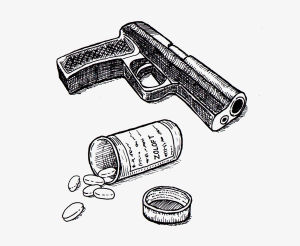Oklahoma State University – April 15, 2013
by Jane Park, psychology student
Instances of mass violence and mass shootings occur undoubtedly too often. When shootings such as those in Sandy Hook, Columbine, Aurora, and Virginia Tech happen, the blame often falls on gun ownership, violent media, or violent video games.
I believe, as a whole, people are overlooking a variable that could very well be at the root of this problem — psychotropic drugs.
Just a couple of days ago news was released regarding the Aurora, Colo. shooter, James Holmes. He was taking the psychotropic drug Zoloft (an antidepressant) as well as another drug called Clonazepam (a benzodiazepine, often used to treat epilepsy as well as anxiety disorders). Zoloft was also prescribed to Eric Harris, the Columbine shooter.
In the past 15 years it is documented in nearly all school shootings the shooter was either currently taking or suffering withdrawal from a prescribed psychiatric drug, and authorities continue to suppress information regarding the drugs both the Sandy Hook and the Virginia Tech shooter were taking.
As cited by the Citizens Commission On Human Rights International (CCHRI), violent side effects caused by taking psychiatric drugs were reported in 12,755 cases to the U.S FDA’s MedWatch. It was also noted such reports are made in only one to 10 percent of the cases experiencing side effects, indicating a much higher rate of violence than official numbers suggest.
It is worth pointing out what these drugs, most often antidepressants, are supposed to do. Their intention is to combat depression, i.e. make people happier. I may or may not be alone on this, but last time I checked being happy is not often associated with committing acts of violence. Clearly something isn’t right.
Further, violence in clinically depressed patients is extraordinarily rare when they are not prescribed psychiatric drugs. When those who are depressed have a difficult time getting motivated to get out of bed, I find it difficult to believe they would be able to find the motivation to conduct mass murder.
Instead of trying to infringe on the rights of citizens to own firearms for both self-defense and to deter government tyranny, perhaps government ought to take a look at the common denominator in most of these mass shootings.
With such a seemingly clear-cut correlation between violence and the use of psychotropic drugs, outrage should be focused on ending government approval of such dangerous medications, not extinguishing the rights of law-abiding citizens.
How many more shootings need to occur before our government begins taking a serious look at the ill effects of psychotropic drugs and makes the link between these drugs and violence? When will the government stop approving and prescribing these unpredictable drugs? What needs to happen to stop psychiatrists, employed by both the state and the private sector, from giving out these psychiatric drugs as if they were candy?
I am becoming increasingly worried such heinous acts of violence that may result from medicating patients will continue to be used to advance the political agendas of our totalitarian leaning government. In order to stop such madness, we must begin thinking independently and ask the questions nobody else will.


